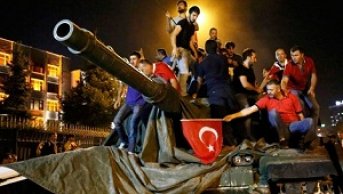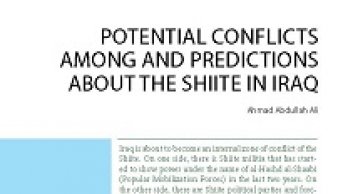Kurdish People’s Approach to The Independence Referendum

Kurdish political actors have varying opinions on the independence referendum to be held by Kurdistan Regional Government (KRG) this September and the establishment of an independent Kurdish state. The different attitudes of Kurdish political forces could be summarized as; supportive, falteringly supportive, those who are hesitant because of the referendum’s timing, and those who believe the political, economic and safety status of the region is not convenient for a vote of independence. Moreover, regional and international actors have an adverse stance towards said referendum. Regionally; Turkey and Iran, internationally; USA, Europe and other forces that are influential in the region have all came out against the decision to hold a referendum. As these objections grow, the most significant question is; what do Kurdish people think about this vote of independence?
Prior to analyzing Kurdish people’s thoughts on the referendum, set for September 25, 2017; it is best to remember KRG’s map of political views. The power, influence and people’s loyalty in Kurdistan region of Iraq were divided between Kurdistan Democratic Party (KDP) and Patriotic Union of Kurdistan (PUK). However, in recent years a third actor emerged uniting ex-members of PUK, academicians, and important figures of public life who oppose these two parties’ policies named Change (Gorran) Movement. During the 2013 parliamentary elections in KRG; KDP came first gaining 38 seats in the parliament. Gorran Party followed them with 24 seats, and PUK took third place winning 18 seats. Kurdistan Islamic Union, Kurdistan Islamic Movement and left-wing parties such as Communist Party of Kurdistan and Kurdistan Toilers’ Party are some other small parties managed to acquire seats in the parliament. However, these small parties’ political attitudes are shaped by the three main Kurdish political parties (KDP, PUK, Gorran). This shows that the map of political power and influence in Kurdistan has begun to change.
When we take a look at the conflicted regions between KRG and Iraqi central government, we can see the influence zones of each political party. While the cities of Erbil and Dohuk are under the influence of KDP, Sulaymaniyah and Halabja are mostly controlled by PUK and Gorran. Legally, Kirkuk is a part of Baghdad central government however, Kurds insist on the voting to include the city, as well.
Nonetheless, the economic crisis, which has been going on for more three years in KRG, has compelled the people to reconsider their views on the political leaders. Regional government has refused to pay the Baghdad central government’s share on oil revenue; therefore the central government cut the region from federal budget. Along with oil prices falling, the economy and investments of KRG were damaged which prevented the government from effectively carrying out many economic projects and investments; primarily public works and settlement. Consequently, thousands of Kurdish people had to immigrate due to high unemployment rates and lack of basic needs. KRG began paying public servants’ wages reduced up to 50% and occasionally, delayed up to four months. Following the increased displeasure, people deemed the regional government, and not the central government, responsible of the declining economy. People believe the regional governors are managing the economy poorly, incapable of paying wages despite the daily production of almost a million barrels of oil, indulged in corruption, and could not benefit from the opportunities emerged with oil prices rising.
The poor economic conditions sparked protests throughout the region. Thousands of public servants, mostly teachers and academicians enraged by the wage cuts and delayed payment, participated in these protests, significant amount of which took place in areas controlled by PUK and Gorran. Protests were held in KDP areas as well, however, in secret. Many observers believe there are two main reasons for people not choosing to protest openly. Firstly, KDP’s security forces are firmly in control of their region. Secondly, KDP leaders have stronger ties to the community and the tribes compared to PUK and Gorran in their regions.
It is a well-known fact that Kurdish people desire an independent Kurdish state. Majority of Kurds share the same national and historical independence dream even though their political ideologies or social customs differ from each other. Striving to make this dream a reality has been always the easiest way for Kurdish politicians to increase their popularity. Ordinary Kurdish citizens who have no ties to Kurdish parties or to their intentions and interests have been emotionally supportive of this cause. However, when they consider current economic problems, security concerns and the political climate; they are doubtful and worried. Local and regional unfavorable attitudes to KRG’s call to referendum also demonstrate this doubt and worry. Perhaps, Kurdish public believe KRG gained enough political maturity for independence however, when it comes to the economy and the military it still has a long way to go. Even though economic problems had never been able to hinder people’s desire for independence, today that might not be the case; as it seems like concerns for security and economy has casted a shadow upon political issues.
The economic crisis that KRG has been struggling with for three years has let the ordinary people of Kurds to understand neither central government in Baghdad nor other countries has been financially aiding the region and there is no real, independent and efficient economy managed successfully in the region. Even though KRG has been regulating economic sources and revenues with no ties to the central government, it hasn’t been able create sufficient economic growth. KRG financial gains are still dependent on oil sales and border checks. As oil prices fell, economy collapsed in the region and the regional government has not been able to pay public servants’ wages and provide basic services such as electricity to its citizens. Therefore, KRG was compelled to ask the central government to pay the salaries of its public servants. Tourism industry in the region has also seen a downfall in its income due to security concerns. Hence, people who have seen KRG failed economically have been asking themselves “What would happen if the region were to be an independent state?” however; they could not seem to answer this question.
Many citizens of KRG believe the referendum will not solve their problems, regardless of its outcome. As a matter of fact, they think the problems will grow and become even more complicated following the vote. Still, KRG citizens expect the results to be supportive of independence no matter the level of voter turnout. This is owing to the fact that the power of Kurdish political leaders that enables them to reach deals with political opponents, uses tribal ties, interfere with Independent Elections Commission or change the results with intimidation. However, the results will not be as equally important as the steps that need to taken after the vote. The actual reason behind all the local, regional and international concerns for the referendum is the fear of what might happen following the voting process. All the actors will strongly stand against any action that might go against their strategic benefits. The anti-independence forces know that the independence movement aims to annex Kirkuk because of the city’s high income of oil. It is impossible to easily manage such a dangerous move. In addition to that, the economic and political climate in KRG and the security issues would not allow the referendum results to be carried out. Thus, citizens of KRG have big concerns towards the vote and the process afterwards the voting increasing their current problems.
All the interested parts of Kurdish issues stated that all the Kurdish leaders, mainly the ones who heavily support the referendum, are aware of the problems they will face after the vote however; they still desire to apply conventional methods of Middle East using the referendum. These methods can be summarized as; changing the course of current situation, and ignoring political and economic issues. Additionally, Kurdish leaders anticipate using the referendum results, which are expected to be in favor of independence, as leverage during the talks with regional and international actors.






